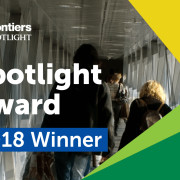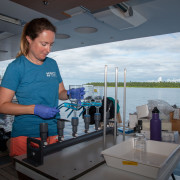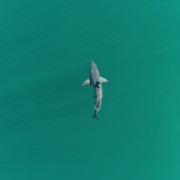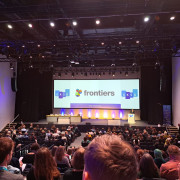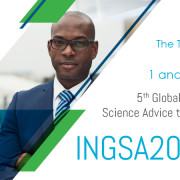- Science News
- Featured news
- The best new research: Finalists announced for the 2018 Frontiers Spotlight Award
The best new research: Finalists announced for the 2018 Frontiers Spotlight Award
From more than 400 outstanding article collections published in 2017, 10 finalists are now in the running for the 2nd annual Frontiers Spotlight Award – and the chance to win US $100,000 to organize an international conference on their topic’s field.
Published as Frontiers Research Topics, these shortlisted article collections each address a globally important field of research with the potential to drastically impact our future — from artificial intelligence to better health to sustainable agriculture. They bring together the latest, cutting-edge research to advance their fields, present new solutions – including to address the UN’s Sustainable Development Goals – and foster essential, large-scale collaborations across multiple disciplines and research groups worldwide.
Which one will be judged as the most important research set to shape our future? We are very proud to introduce this year’s Spotlight finalists … and stay tuned for the winner announcement later this year!
2018 Frontiers Spotlight Award finalists(in alphabetical order of the Research Topic name)
Creating intelligent social robotsTopic Editors: Hatice Gunes, Ginevra Castellano & Bilge Mutlu
For robots to be truly accepted in society, they must recognize and interpret not just what we say, but also our nonverbal social cues — like body position, gestures, gaze and silences. And conversely, we humans need to trust and like our robot companions. Affective and Social Signals for HRI advances the challenging and emerging field of Human-Robot Interactions (HRI) and informs the use of robots for public good.
Improving our brains with exercise – and video gamesTopic Editors: Soledad Ballesteros__, Claudia Voelcker-Rehage & Louis Bherer
Evidence is growing that physical exercise and video games can enhance cognitive functioning and prevent cognitive decline – at least in the short term. Cognitive and Brain Plasticity Induced by Physical Exercise, Cognitive Training, Video Games and Combined Interventions looks at ways to maximize these benefits more permanently, across all age groups and in both healthy and cognitively impaired people.
Enhancing mental health through gamingTopic Editors: Yasser Khazaal__, Jérôme Favrod__, Stéphane Bouchard__, François Borgeat & Anna Sort
Games and computers provide an important opportunity to improve treatment of, and help prevent, mental disorders — yet the field remains under-studied and information is under-disseminated in clinical practice. Computers and games for mental health and well-being charts the latest knowledge and developments on these potentially lifesaving tools.
Understanding the Earth’s deep carbonTopic Editors: Donato Giovannelli__, Alysia Danielle Cox__, Cody Sheik & Benjamin Alexander Black
Carbon release and sequestration are pressing issues facing our society. Deep Carbon in Earth: Early Career Scientist Contributions to the Deep Carbon Observatory brings together the latest research on the Earth’s natural carbon cycle. From volcanic activity to microbiology to natural CO2 sequestering, this research helps decipher the consequences of anthropogenic carbon emissions, offers clues for addressing ongoing emissions and helps predict our planet’s future.
Reducing damage from earthquakesTopic Editors: Katsuichiro Goda__, Tiziana Rossetto__, Nobuhito Mori & Solomon Tesfamariam
Ground shakes, tsunamis, landslides … these and other earthquake-related hazards pose major threats to individuals and modern society alike. Mega Quakes: Cascading Earthquake Hazards and Compounding Risks unites previously fragmented and inconsistent approaches and tools for assessing the risks of such hazards, with the aim of reducing loss of life and damage from potentially catastrophic earthquakes.
Achieving sustainable agricultureTopic Editors: Maria Tsiafouli__, Evangelia G Drakou__, Alberto Orgiazzi__, Katarina Hedlund & Karl Ritz
New agricultural systems are urgently needed to meet the growing demand for food and biomass, while also maintaining nature areas and mitigating the climatic and environmental impacts of human activities. Optimizing the Delivery of Multiple Ecosystem Goods and Services in Agricultural Systems provides critical knowledge for informing management regimes that enhance both agricultural production and the provision of multiple ecosystem services essential for both biodiversity and human wellbeing.
Predicting and preventing disease with big dataTopic Editors: Tarun Stephen Weeramanthri__, Matthew Bellgard__, Gareth Baynam__, James Bernard Semmens__, Hugh J.S. Dawkins & Ori Gudes
Public health has always relied on data to inform policies and priorities, drive health improvement across whole populations and target disadvantaged groups. Precision Public Health takes this to the next level. Building on the paradigm shift that started with human genome sequencing, it identifies other big-data tools and technologies for analyzing individuals and groups more precisely – exploring for the first time the value of this approach and identifying barriers and opportunities for targeted public health strategies.
Managing health and disease through our gutTopic Editors: Nathan W. Schmidt__, Venkatakrishna Rao Jala__, Michele Marie Kosiewicz & Pascale Alard
Our intestines are home to vast numbers of bacteria, fungi and other microbes – which, far from being parasites, are increasingly recognized as being intricately involved in our health. The Gut Microbiome in Health and Disease raises awareness of this rapidly growing field, highlighting the diverse effect of the gut microbiome in a range of disease settings — including autoimmunity, cancer and inflammatory bowel disease – and its potential for new treatment options.
Finding a cure for tinnitusTopic Editors: Christopher R. Cederroth__, Arnaud Norena__, Berthold Langguth__, Winfried Schlee__, Sven Vanneste__, Tobias Kleinjung__, Jose Antonio Lopez-Escamez__, Pim Van Dijk__, Martin Meyer__, Grant Searchfield__, Peyman Adjamian__, Rilana f.f. Cima__, Deborah A Hall__, Birgit Mazurek__, Heidi Olze__, Giriraj Singh Shekhawat__, Nathan Weisz__, Silvano Gallus__, Jianxin Bao__, Antonello Maruotti__, Rüdiger Christoph Pryss__, Manfred Reichert__, Thomas Probst__, Bård Støve & Myra Spiliopoulou
More than 100 million people worldwide suffer from chronic tinnitus — the perception of a sound when no external sound is present. A major obstacle in developing effective treatments is the large variation between patients. As the largest-ever collection of multidisciplinary research in this young field, Towards an Understanding of Tinnitus Heterogeneity provides new avenues for better therapeutic outcomes.
Recognizing the vestibular systemTopic Editors: Bernard Cohen__, Richard Lewis & Jose Antonio Lopez-Escamez
Balance and eye movement are fundamental to body function– yet relatively few physicians are aware of how this vestibular system interacts with other body systems, even in common conditions such as vertigo, dizziness and motion sickness. Vestibular Contributions to Health and Disease presents the new field of Vestibular, Cerebellar and Autonomic System Disorders – bringing vital knowledge and new treatments to doctors and emergency rooms worldwide.
About the Frontiers Spotlight Award
The annual Frontiers Spotlight Award supports emerging and important fields of research published as a Research Topic in Frontiers journals.
Each year, the most active, collaborative and impactful Research Topics from the previous year are shortlisted according to their scientific and editorial excellence, international reach, subject novelty and interdisciplinarity. A Jury, drawn from members of the Frontiers Editorial Board, is then tasked with evaluating the shortlist in order to produce the final winner.
The winning team of Topic Editors receives a budget of US $100,000 to organize an international scientific conference on the theme of their Research Topic. The conference brings together academics from around the world and provides a forum to collaborate, inspire and highlight groundbreaking research. The conference for last year’s Spotlight Award is taking place this September at the SwissTech Convention Center on the campus of the Swiss Federal Institute of Technology in Lausanne (EPFL).
About Frontiers Research Topics
Research Topics are peer-reviewed article collections published around specialized themes. They bring together leading researchers from different institutions, locations and fields of interest, who collaborate and contribute articles. Research Topics are featured across key areas throughout Frontiers’ full editorial program: life sciences, health, physical sciences and engineering, humanities and social sciences, and sustainability.
Published on Frontiers’ award-winning platform, Research Topics are fully open and accessible, and become highly visible collections of work, enhancing both the readership and citation of articles.
If you have questions on the Spotlight Award or Research Topics, please contact spotlightaward@frontiersin.org — we will be happy to assist you.


